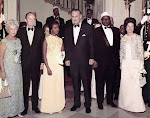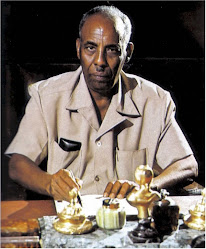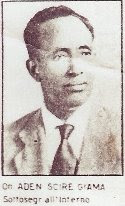Mr. Mohamed at his cubicle in Buffalo last month, working again for New York State government.
BUFFALO — At his cubicle at the State Transportation Department building here, Mohamed Abdullahi Mohamed recounted what he did during a recent leave of absence. He trimmed the size of the federal government. He instituted regular paychecks for the military. He campaigned against corruption. And he avoided being shot.
“Every morning when I was brushing my teeth I heard bullets hitting the metal over my window,” Mr. Mohamed said. “It was like, pop pop pop pop. The first day I was shocked. But after that I knew the bullets would not get through, so I continued brushing.”
Mr. Mohamed, 49, smiled genially over the neutral-toned cubicle dividers and file cabinets of the state office building. For eight months, starting last November, he was the prime minister of his native country, Somalia, one of the most chaotic nations on earth. And then, as suddenly as he had left, he was back in his cubicle at the Transportation Department, where he makes sure the department’s contracts and contractors comply with nondiscrimination and affirmative action requirements.
“This is my life,” he said.
Mr. Mohamed, who has lived in the United States since 1985, said he had no plan to join the Somali government when friends helped him arrange a meeting with the country’s president, Sheik Sharif Sheik Ahmed, in September 2010 during a meeting of the United Nations General Assembly in New York. Mr. Mohamed said he talked to the president about how factions in government might cooperate, drawing on his own experience working with difficult contractors in Erie County. At the time, the president had just dismissed his previous prime minister. As soon as Mr. Mohamed returned to Buffalo, he said, his friends called to say the president liked his ideas — and would he consider submitting his résumé to be prime minister? “My wife was not supportive of the idea,” he said. “But I told her, if I don’t do it, who will? I said, violence comes from conflicts, and I’ve learned how to resolve conflicts. That’s exactly what I do here.”
Richard Downie, deputy director of the Africa program at the Center for Strategic and International Studies in Washington, said that because so many Somali professionals had left the country, émigrés working in other countries were sometimes tapped for high government positions. One chief of staff in the Somali military had been working as an assistant manager in a McDonald’s in Germany, Mr. Downie said.
On Oct. 14, 2010, after a meeting with Somalia’s president in Mogadishu, Mr. Mohamed was appointed prime minister, and by November he was on the job, governing a country ravaged by terrorism and on the brink of dire famine. “I called my wife every other night so she would know I’m still here,” he said. His interior minister was killed by a suicide bomb carried by the minister’s niece. “It was a risk,” he said. “But if you want to do good things, a position like that comes with a level of personal risk.” His salary was the same as what he earns at the Transportation Department, from which he took a one-year leave of absence. Mr. Mohamed grew up in the capital city, Mogadishu, the son of a government airline administrator. He joined the Somali ministry of foreign affairs in 1982, and was transferred to Washington in 1985. After he criticized the Somali government in 1988, he applied for asylum in the United States, fearing for his safety if he returned to Somalia. “I knew if I went home anything could happen,” he said. Because he had relatives in Toronto, he moved to Buffalo, where he earned a bachelor’s degree and a master’s in political science at the State University of New York at Buffalo and became part of a local expatriate community of about 1,000 Somalis, he said.
The culture shock was profound. “Take appointments,” he said. “Here you have to be on time. Back home that was not a huge issue. Maybe you could be one and a half hours late. That’s why the diaspora can make a big difference in Somalia, because we can take back what we learned in the first world.” As prime minister, Mr. Mohamed assembled a cabinet of technocrats to run the country, reducing the cabinet’s size to 18 from 39, most from outside the country. He campaigned against corruption and set up a regular payroll for the military. “He came in talking tough on corruption,” Mr. Downie said. “And there was quite a lot of public demonstration of support for him. But there’s little evidence of any improvement made. The ultimate verdict is that his heart was in the right place; he went in and was immediately fed to the sharks.” The sharks in this case were the president and the speaker of Parliament, Sharif Hassan Sheik Adan, who in June settled a long and bitter fight for power by sacrificing Mr. Mohamed, who was allied with the president. “That was the downfall of Mohamed,” Mr. Mohamed said. “Temporary, I hope.” Government soldiers and civilians rioted in protest, saying Mr. Mohamed was the government’s only honest leader. He was replaced by his former deputy, Abdiweli Mohamed Ali, who was an economics professor at Niagara University, near Buffalo. By June, Mr. Mohamed was back in Buffalo. “My job here was always something to fall back on if Somalia didn’t work out,” he said. Mr. Mohamed said he was enjoying not having to look over his shoulder for assassins and to be living at home with his wife and four children. Some critics have questioned Mr. Mohamed’s public stance against corruption, and an audit of the transitional government recommended forensic investigations of his office as well as of those of the president, speaker and other officials. A United Nations report in July called “endemic corruption of the leadership” in Somalia the “greatest impediment” to a working government. “If the argument is that he fought corruption, it’s either a smoke screen or he’s absurdly incompetent,” said J. Peter Pham, director of the Michael S. Ansari Africa Center at the Atlantic Council in Washington. “Corruption grew during his tenure as prime minister.” Mr. Mohamed said he tried to combat corruption from inside the government. “That’s why we won the hearts and minds of people,” he said. Some of the challenges in Somalia were the same as they are at the Transportation Department, he said. “When I’m here, I’m helping minorities,” he said. “And over there, it’s a different capacity and responsibility, but the purpose is the same.” But he said he hoped to return to Somalia, perhaps even to run for president. “It’s a mixed feeling to be here,” he said. “I believe I have some duty to go back one day and play some role. I don’t know what that role will be.” Janine Shepherd, who works in the next cubicle, said she was glad to have him back. “We were all surprised,” she said, “when he became prime minister: ‘What? Our Mohamed?’ ” When he came back, she said, they made him a cake. “We weren’t sure he’d return to D.O.T.,” she said, “because once you do something grand like that, to come back to this humble work is something else.”




.jpg)











No comments:
Post a Comment